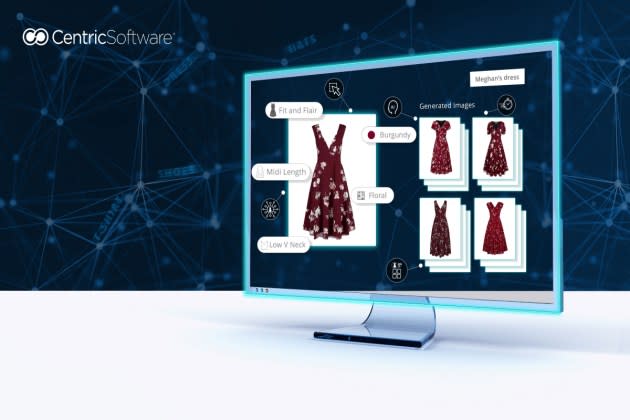Centric Software Releases Gen AI-Powered Apparel Design Tool

Centric Software wants to make the process of designing apparel less time consuming with the help of artificial intelligence.
The company, which specializes in product management software, launched its new, generative AI-powered design tool, which it calls Fashion Inspiration, on Monday.
More from Sourcing Journal
Saurabh Deshpande, vice president of product management and UX design, said the company built the technology on top of Stable Diffusion, a model for image generation and trained it on Centric’s own data set.
“We started with teaching it 10,000 images, and the results were OK, nothing great. [Then we tried] 100,000 images, and the results were multiple degrees of fidelity higher, and that then gave us the confidence that we are onto the right technology here, because, as the model learns with clean data, with meaningful data, what it generates is really meaningful as well,” he said.
The model has now been trained on over 1 billion images of fashion and apparel products across 800 categories, the company noted in a release. Because it has been trained on such a broad data set, it can hone in on details like buttons, pleats or neckline specifications.
When a designer, planner or merchandiser uses Fashion Inspiration, they can approach it in a few ways. The tool allows users to upload photos or existing sketches, which can then be rendered into digital images and tweaked from there. Alternatively, users can select choices from various menus that show product attributes. For instance, a user could ask the model to create a midi-length, V-neck dress in burgundy with a floral pattern.
Whichever way the human in the loop starts designing the product, the system gives the user multiple options, which can then be tweaked using natural language prompts or by changing inputs.
Trademark and copyright infringement questions have floated throughout creative industries, including fashion and apparel, about the legality of using generative AI for design. Because Fashion Inspiration is trained on so many images from different brands and retailers’ collections, Deshpande said, at least in the early days of adoption, compliance and legal teams should be involved with vetting designs aided by generative AI, just as they would otherwise be for designs created fully by humans.
To ensure uniqueness in the designs and prevent duplicative work for separate companies, the company has set specific parameters on the model’s ability to re-create the same image twice.
“Whilst, yes, the model has a risk, we are through our testing looking at, how do we ensure that it does not copy like to like? The other thing we’re doing is not letting the model generate the same image more than once—so every image is unique; it will never spit out the same image, no matter how much you try,” he said. “At the end of the day…there still has to be a human at the brand to make sure that there’s no violation or infringement happening. That aspect doesn’t go away [with AI].”
One of the main goals Centric kept in mind while training Fashion Inspiration was cutting down the time to market for products, particularly as the trend economy among consumers stays hot. As more companies begin testing and using the technology, the Centric team plans to make further improvements. Ultimately, Desphande said, he wants Fashion Inspiration to be able to learn from how humans working with specific clients alter and select designs aided by the technology.
Centric said it does not yet have data that represents the time the tool could save designers, and also noted that the metric it’s actually starting to measure is the percentage of styles generated by Fashion Inspiration that make it to production.
According to Celia Newhouse, corporate content marketing director for Centric, Fashion Inspiration is not available as a standalone product; it will only be available to those using or onboarding onto Centric’s Product Lifecycle Management (PLM) software. Current Centric PLM clients include Guess, Louis Vuitton and Mizuno; Centric declined to disclose which companies have started piloting Fashion Inspiration.
She noted the target clients for the technology include companies using the fast- or ultra-fast-fashion model, as well as on-demand manufacturers developing styles for brands.
Newhouse said Fashion Inspiration has versatility and will likely be useful throughout different pockets of the fashion and apparel market, from small-to-medium companies to major enterprises. Realistically, the limitation on whether the tool is of use is whether the company has the culture and systems in palace to handle the technology integration.
“When it comes to AI, just like everything else, it’s about being open to it; some companies are just not ready for it. They don’t have that maturity; they’re not ready to accept new technology. It takes a certain maturity in terms of technology adoption—and especially AI, which can trigger a lot of fear and uncertainty with companies,” she told Sourcing Journal.
Solve the daily Crossword

